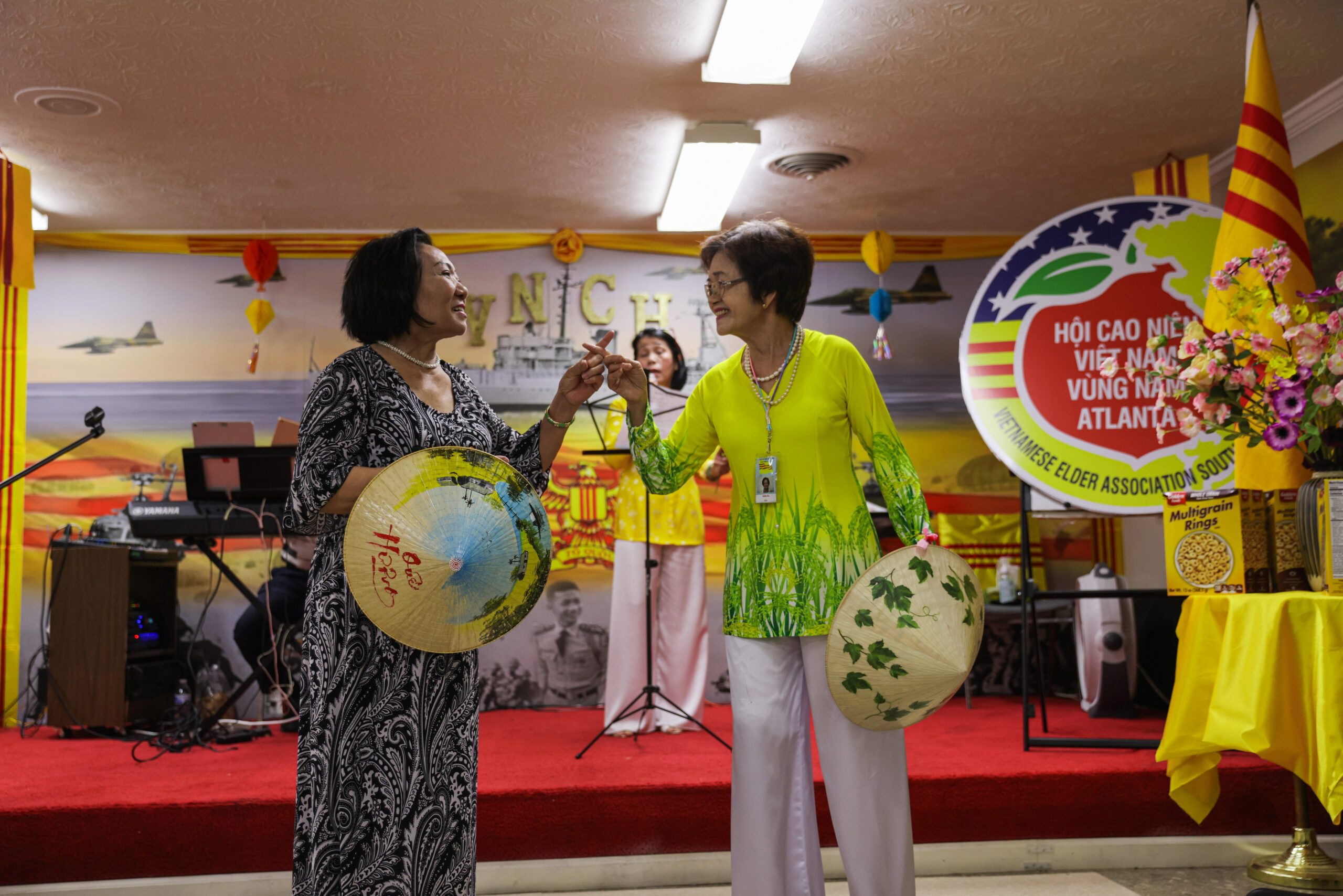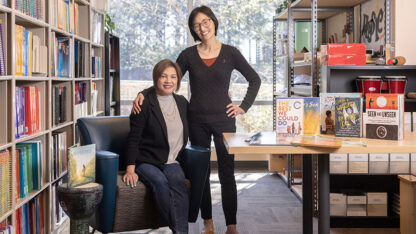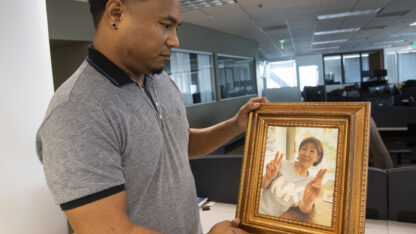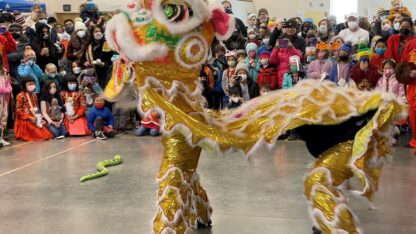This story was produced in partnership with Canopy Atlanta, a community-powered nonprofit newsroom. This story’s topic was informed by feedback from more than 120 Forest Park residents and was reported in collaboration with a Canopy Forest Park Fellow, community members whom Canopy Atlanta trained in reporting skills.
The parking lot surrounding the Vietnamese Elder Association South Atlanta fills up on Saturday afternoons. This particular July afternoon is a hot one in Forest Park. The sound of music, muffled by fans, travels through the building’s open front door.
Inside, men and women in their 50s and up take turns on stage, singing and dancing along to decades-old Vietnamese music. They stand in front of a wall-sized collage of heroic-looking images of the Vietnam War, with fighter planes, a military ship, and a smiling Vietnamese couple in uniform at the center. At banquet tables before the stage, a hundred or so people watch, looking just as happy, as they laugh with each other and beam at the performances.
The seniors here off Jonesboro Road are the bedrock of the Vietnamese community in Clayton County. It’s the third-largest Vietnamese enclave in Georgia, with about 8,700 residents. It gets little attention compared to the larger clusters of Vietnamese residents on Atlanta’s Northside, along Buford Highway, which is widely known for its Asian American restaurants and businesses, and beyond. That also shows in the demographic data. The Northside community in Gwinnett County, for example, is growing at ten times the rate of the Southside.
Many of the Vietnamese immigrants who’ve lived in and around Forest Park for decades don’t seem to mind. They were forced to leave their first home in Vietnam. The reason is visible inside the seniors’ association. Embedded in corners are yellow flags with red stripes. The flags represent South Vietnam, a country that hasn’t existed since it surrendered to North Vietnam in 1975 following the withdrawal of U.S. forces. At that time, many of the elders here became refugees.
In need of a new home, they found it in Clayton County and Forest Park. And they’ve become a significant part of Forest Park, representing three-quarters of its Asian residents. They’ve established their own businesses and developed services to meet their community’s needs.
They have no plans to uproot again.
Moving around in the background at the Vietnamese Elder Association is Larry Nguyen. He has the look of a businessman, with a white button-down shirt tucked into his slacks. For years, he invested in property around Forest Park: restaurants, homes, and a flea market. He bought this building, too, and turned it into the senior center five years ago.
While the Northside might have more things for young people to do, like going to bars and nightclubs, Nguyen says older people enjoy living south of Atlanta. They can relax here.
“The Southside is different from Northside. The Southside people are real quiet,” he says. “The Northside is very busy.”
According to Nguyen, it took some time for the Vietnamese residents south of Atlanta to come together.
Forty years ago, when he first arrived in Clayton County and worked for a trucking company, Nguyen recalls hearing there were a few thousand Vietnamese people in Georgia. But living on the Southside, with the spread-out, suburban single-family homes and strip malls, he had to work to spot them.
“I see you, look like Asian people. I say, ‘Oh, you Vietnamese?’ They say, ‘Oh, I’m Vietnamese.’ I’m real happy,” Nguyen says. “‘Come to my house. Have lunch. Have dinner.’”
In the decade that followed, the number of Vietnamese in Georgia rose fast. The Vietnamese population expanded from around 2,000 in 1980 to almost 8,000 by 1990. This number has increased to more than 57,000 Vietnamese in Georgia today.
Many came to Georgia through local resettlement programs or to reunite with family members. Despite language barriers and hardships along the way, that generation who fled as refugees and emigrants would open up many of the businesses, nail salons, and restaurants that now dot Jonesboro Road. Their migration stories, although shared and understood within the Vietnamese community, can be kept private from outsiders.
In one of several Vietnamese-owned auto shops, an owner, dressed in his mechanic’s workwear, remembers his experience of escaping by boat when he was only 17. He asks that we not publish his name. The shop owner stands up, extending his arms, to show the size of the boat — about the same length as the small waiting room. It held more than a dozen people for the three-week journey.
“I lay across the boat, with my head and my toes touching the water,” he says. “Very scary, very dangerous. That was the only hope, so we have to keep going.”
There were multiple stops before he found his long-term home: Hong Kong, California, and finally Georgia. In the beginning, new residents like him received help through the government. Federally paid social workers guided the refugees through the resettlement process.
The shop owner believes Vietnamese immigrants share a deep gratitude toward the U.S.
“That’s why they take it like a second country and they call it home,” he says.
Four decades later, few resources remain for Vietnamese immigrants in Clayton County. Nonprofits that help Asian Americans with language services or housing needs, like the Center for Pan Asian Community Services, are located north of Atlanta and into Gwinnett County, where the majority of Vietnamese residents also live. When Canopy Atlanta surveyed Vietnamese families in Forest Park, none could name a local nonprofit organization as a resource.
Faced with this absence of services, the community supports itself. At the Vietnamese Elder Association South Atlanta, Nguyen, the founder, points to the office in the back room where people can get paperwork translated or apply for documents they need.
“You don’t understand English. You receive a letter. You come here. They help you understand,” he says. “You want to apply for Medicare, they help you with Medicare. You apply for food stamps, they help you with food stamps.”
Across from the office, the walls are lined with cardboard produce boxes for the association’s food pantry, sponsored by the Atlanta Community Food Bank. On the 21st of every month, low-income families of Vietnamese or any background can come pick up food, a volunteer-run effort that Nguyen says continues during the COVID-19 pandemic.
The elder association also partners with Viet Home Care, a senior health-care service in Gwinnett County that recently expanded its reach to Clayton County. With these services and resident-led efforts, several people told us they believed the Southside Vietnamese community is only becoming stronger.
The population has held steady, at least. The latest release of 2020 Census data even shows a slight increase of 700 Asian people in Clayton County since 2010. That’s amid bigger demographic shifts countywide. In those same years, the white population in Clayton County decreased by more than 18,000 people, and the number of Black residents rose by more than 35,000.
But the growth of the Vietnamese population in Clayton County is only a fraction of the 13,000 estimated rise in the Vietnamese population in Gwinnett County.
According to Kim La, a local real estate agent whose clients are often Vietnamese, high-paying jobs and better schools draw people north. Some of the most popular areas now are in northern Gwinnett County, near cities like Dacula and Buford, where families can still find affordable homes.
A mile away from the elder association in Forest Park, near a quiet neighborhood of predominantly Vietnamese-owned single-family homes, is a Buddhist temple, Chùa Hải Ấn. In addition to offering a place of worship, the temple provides Vietnamese language classes for children and a community altar for family members who have passed away.
On a weekday afternoon, the head monk, Thích Huệ Nghiêm, finishes meeting with a visitor in the courtyard, shaded by peach trees. She’s friendly, smiling often, dressed in earth-toned clothing with her head shaved. Her migration story is also linked to the war. One of her brothers worked with the CIA during the conflict, and another was placed in a postwar reeducation camp for those affiliated with South Vietnam and the American military. Thích Huệ Nghiêm’s third brother escaped the country by boat and eventually facilitated her migration to the U.S.
She first settled in Seattle in the 1990s. But after the rain and chilly weather in the Pacific Northwest, Thích Huệ Nghiêm was glad to move to Clayton County in 2003 to start this temple. With the warm climate and trees, she describes this area south of Atlanta with the same word used by several other longtime Vietnamese residents: peaceful.
“Back then, I saw that this place had a lot of vegetation, like a forest. It reminded me of a school that I went to in Vietnam,” she says.
Thích Huệ Nghiêm has noticed the population changes around her. As the children of the Vietnamese immigrants in Forest Park become adults and begin lives of their own, she says, they often choose to move to Atlanta’s northern suburbs. And she’s heard this move north is partly due to the promise of better schools.
But Thích Huệ Nghiêm looks at the schools around Clayton County and sees the Vietnamese students excelling. The valedictorians for the past three years at Forest Park High School have been Vietnamese-Americans.
Vietnamese residents have also watched the expanding influence of Vietnamese Americans in local government throughout south metro Atlanta. Two Vietnamese attorneys, Ethan Pham and Jenny Nguyen, who are husband and wife, recently became judges in nearby Morrow. While Forest Park has yet to elect someone of Vietnamese descent to the local government, Ward 3 Councilman Hector Gutierrez says the city also tries to be inclusive.
“I will say that as a city, we are making efforts to have Vietnamese employees,” he says. “And also, we budgeted this year for our first-ever celebration of Asian heritage.”
The strength of the Southside community fuels the optimism of the Vietnamese immigrants who’ve made Clayton County their home and plan to remain here. But it doesn’t play a role in Thích Huệ Nghiêm’s decision about her future. Asked whether she will stay in the area, she answers graciously, but without any doubt.
“Usually, Buddhist people live at the temple, no matter what the circumstances,” she says. “I will still live here.”









